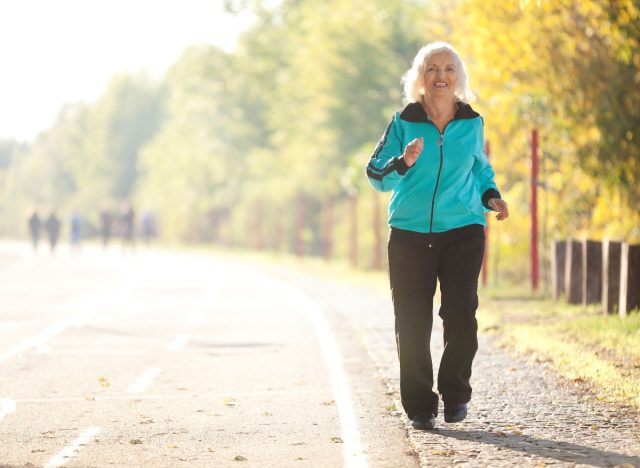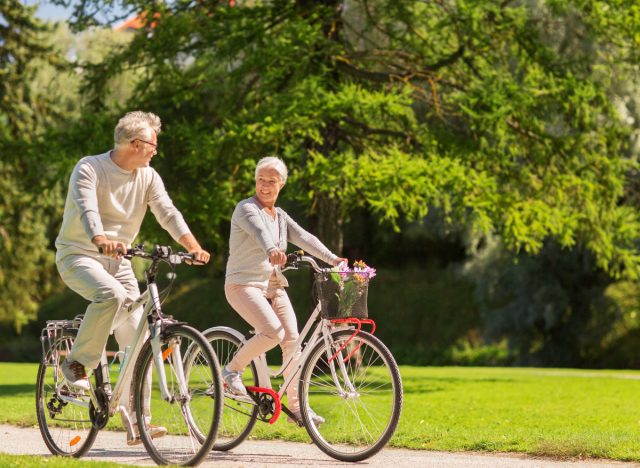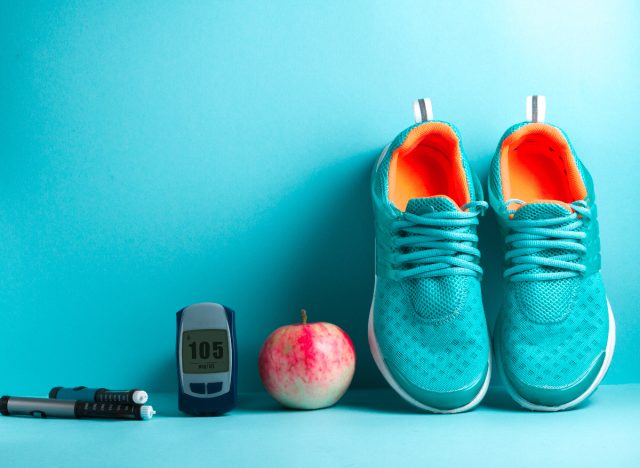Doing This Exercise After Meals Can Boost Your Health, Study Says

You may have been taught that it's unwise to exercise after meals. Quite to the contrary, according to a recent study, exercising a bit after eating can actually be beneficial to your health. Sure, in some cases, going hard with a workout on a full stomach can cause nausea, cramps, bloating, reflux, sluggishness, and general discomfort, according to Healthline. But this recent study reveals light exercise can boost your health. Read on to find out more.
A quick two to five-minute walk, bike ride, or yoga session post-meals can improve blood sugar levels.

A report published in Sports Medicine reveals there are positive effects to taking a short walk after eating. Specifically, a short two to five-minute walk can help lower your risk of developing diabetes, while impressively improving your blood sugar levels.
Endocrinologist at Hartford HealthCare Medical Group, Michael LeMay, MD, explains via Hartford HealthCare, "It really doesn't matter what the exercise is." A bike ride, light weight lifting session, swimming, or even stretching it out with yoga works as well.
Related: What Walking Every Day Does to Your Body, Expert Reveals
Light-intensity exercise after meals can help prevent your glucose levels from peaking.

Your blood glucose levels rise post-meals. When that happens, insulin is released by the cells in your pancreas. This causes your body to use glucose from the blood, which decreases your blood sugar level, bringing it back to normal, according to Kaiser Permanente.
As per the authors of the study, muscle contractions help this process along. Your glucose peaks between an hour to 1 1/2 hours following a meal. Exercising lightly before that jump can prevent that rise in glucose (via Hartford HealthCare).
Related: The Top 5 Walking Habits That Slow Aging, Fitness Expert Reveals
Controlling your blood sugar can help you avoid health complications.

Why is controlling blood sugar so important? Diabetes is a serious illness. In fact, 37 million individuals have diabetes in the U.S., and 96 million are prediabetic status as of 2019 (via Hartford HealthCare). Dr. LeMay points out, "Those people who optimize their blood sugar are decreasing their chances of complications that lead to poor quality of life."
It's essential for diabetics to avoid drastic fluctuations in blood sugar levels. Additionally, drastic changes in blood sugar levels can heighten your risk of developing Type 2 diabetes (via The New York Times).
Walking activates your muscles more than if you were standing, so squeeze in that post-meal stroll!

This research included analyzing data from seven individual studies, where participants walked or were asked to stand in place for a timeframe of two to five minutes. They did this throughout the day every 20 minutes or half hour. Each of the seven studies revealed that walking from a light intensity level for a few short minutes after eating a meal caused participants to have a noticeably better blood sugar level, followed by a more gradual drop, compared to staying sedentary, according to The New York Times.
Standing individuals also experienced lower blood sugar levels, but not nearly as noticeable as those who walked. Aidan Buffey, another author of the paper and graduate student at the University of Limerick in Ireland noted when comparing sitting to standing, "Standing did have a small benefit," adding, "light-intensity walking was a superior intervention." Walking activates the muscles more than standing, so it's really beneficial to squeeze in a walk post-meals.








